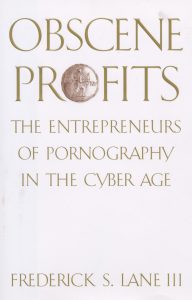 If love means never having to admit you posted nude photos of your partner on an adult Web site, then romance has taken quite a hit in the Internet era. Unfortunately, the explosion of digital cameras, smartphones with cameras, and laptops with Web cams has resulted in an explosion of homemade pornography. (The “democratization of porn” was one of the topics I covered in my first mainstream book, Obscene Profits: The Entrepreneurs of Pornography in the Cyber Age [Routledge 2000].)
If love means never having to admit you posted nude photos of your partner on an adult Web site, then romance has taken quite a hit in the Internet era. Unfortunately, the explosion of digital cameras, smartphones with cameras, and laptops with Web cams has resulted in an explosion of homemade pornography. (The “democratization of porn” was one of the topics I covered in my first mainstream book, Obscene Profits: The Entrepreneurs of Pornography in the Cyber Age [Routledge 2000].)
In the current digital era, however, it is simultaneously much easier to create pornography in the privacy of one’s home and much more difficult to make sure that those images and videos don’t wind up ricocheting around the Internet. One of the unfortunate by-products of the Internet has been the rise of so-called “revenge porn” sites, which traffic in nude and sexually-explicit images submitted by disgruntled former boyfriends (or much more rarely, girlfriends). Given the nature of digital imagery, a post to a even a single Web site can wind up becoming “Public and Permanent” if it is copied to other sites around the world. And of course, even if the image is not “public,” it almost certainly is “permanently” part of a seemingly-infinite number of private porn collections.
There have been some recent efforts to criminalize the distribution of “revenge porn” without a subject’s consent. Seventeen states have adopted laws prohibiting the practice, and one of the most notorious “revenge porn” merchants, Hunter Moore, was jailed for extorting money from victims. But the barriers to effectively combatting “revenge porn” are both constitutional and practical. Sites that host these types of images take refuge behind the robust application of the First Amendment to the Internet, and legislators are hesitant to inflict constitutional damage by legislating too broadly. And while victims can try to sue for invasion of privacy, intentional infliction of emotional distress, and other torts, it can be difficult to even locate a defendant, let alone one with enough resources to make a suit worthwhile.
Faced with those daunting challenges, one woman came up with an innovative solution: she filed for U.S. copyrights on the nude images she took and sent to her scuzzball ex-boyfriend. Altogether, she submitted copies of more than 100 photos to the U.S. Copyright Office for protection. Normally, when a copyright is granted, the copyrighted materials are sent to the Library of Congress for cataloging and access by the public; however, an applicant can file a request that the images be kept private, which in this case was granted. The Copyright Office also assured the applicant that only one person would see the images during the application for copyright.
With her copyrights in hand, the “revenge porn” victim was able to get some Web sites to remove her nudes, but many more copies of nude images of her are still on the Web. As her attorney noted, it is an endless task to track down every copy of a nude photo and try to get it removed. Moreover, this particular victim was only able to get a copyright because she had taken photos of herself. If she were trying to get photos removed that her ex-boyfriend had taken, it would be much more difficult because she would not own the copyrights in those images.
This is a serious problem that requires a federal solution. I am a staunch defender of the First Amendment, but I don’t see the risk in Congress passing a law that makes it a crime to publish a nude or sexually explicit image of someone without their consent using equipment or services that travel in interstate commerce. We are coming up on the 105th anniversary of the Mann Act; I think the time has come for Congress to adopt a “Digital Mann Act” that would make it clear across the U.S. that “revenge porn” is a crime.
